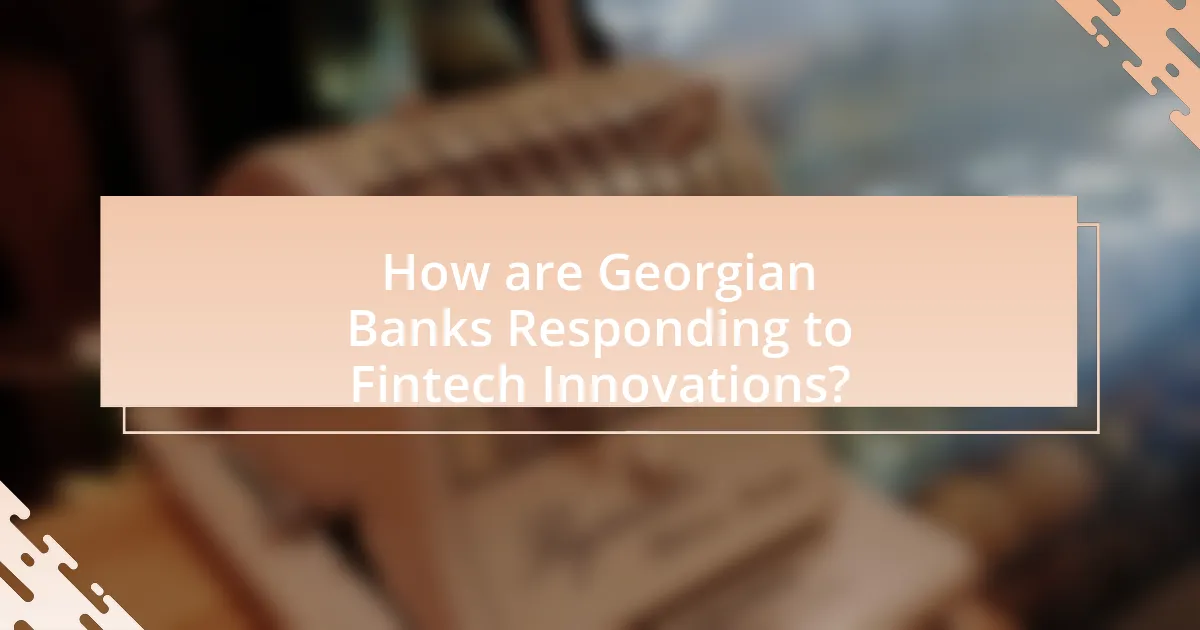Georgian banks are increasingly adapting to fintech innovations by integrating digital banking solutions and enhancing customer experiences. Key developments include the launch of mobile applications by major banks like TBC Bank and Bank of Georgia, which facilitate seamless transactions and online account management. The article explores the impact of mobile banking, digital payment solutions, and blockchain technology on banking operations, highlighting the importance of regulatory compliance and customer demand in driving fintech adaptation. Additionally, it discusses the challenges faced by banks in adopting these technologies and the strategies employed to foster partnerships with fintech startups, ultimately aiming to improve service delivery and operational efficiency in the evolving financial landscape of Georgia.

How are Georgian Banks Responding to Fintech Innovations?
Georgian banks are actively embracing fintech innovations by integrating digital banking solutions and enhancing customer experiences. For instance, banks like TBC Bank and Bank of Georgia have launched mobile applications that facilitate seamless transactions, online account management, and digital payment services. These initiatives reflect a strategic shift towards adopting technology to meet the evolving demands of consumers, as evidenced by a 2022 report from the National Bank of Georgia, which highlighted a significant increase in digital banking usage among the population. Furthermore, Georgian banks are collaborating with fintech startups to develop innovative products, thereby fostering a competitive financial ecosystem that aligns with global trends in financial technology.
What are the key fintech innovations impacting Georgian banks?
Key fintech innovations impacting Georgian banks include mobile banking, digital payment solutions, and blockchain technology. Mobile banking has significantly increased accessibility for customers, allowing them to perform transactions and manage accounts via smartphones, which is evidenced by the rapid growth of mobile banking users in Georgia, reaching over 1.5 million in recent years. Digital payment solutions, such as contactless payments and e-wallets, have streamlined transactions, enhancing customer convenience and reducing cash dependency. Additionally, blockchain technology is being explored for improving security and transparency in transactions, with several Georgian banks piloting blockchain-based solutions to enhance operational efficiency and reduce fraud risks. These innovations collectively contribute to the modernization of the banking sector in Georgia, aligning with global fintech trends.
How do digital payments influence banking operations in Georgia?
Digital payments significantly enhance banking operations in Georgia by increasing transaction efficiency and reducing operational costs. The adoption of digital payment systems allows banks to process transactions in real-time, which improves customer satisfaction and reduces the need for physical branches. According to the National Bank of Georgia, the volume of electronic payments has grown substantially, with a reported increase of over 30% in digital transactions from 2020 to 2022. This shift not only streamlines banking processes but also encourages financial inclusion by providing access to banking services for a broader population, particularly in rural areas.
What role do blockchain technologies play in Georgian banking?
Blockchain technologies play a significant role in Georgian banking by enhancing transparency, security, and efficiency in financial transactions. Georgian banks are increasingly adopting blockchain to streamline processes such as cross-border payments, which reduces transaction times and costs. For instance, the National Bank of Georgia has explored blockchain for improving the efficiency of payment systems and ensuring secure record-keeping. Additionally, the integration of blockchain in banking operations helps mitigate fraud risks and fosters trust among customers, as transactions are immutable and verifiable. This adoption aligns with global fintech trends, positioning Georgian banks to compete effectively in the evolving financial landscape.
Why is it important for Georgian banks to adapt to fintech?
It is important for Georgian banks to adapt to fintech to enhance their competitiveness and meet evolving customer expectations. The rise of fintech has transformed the financial landscape, offering innovative solutions that improve efficiency, reduce costs, and provide better customer experiences. For instance, according to a report by the National Bank of Georgia, the adoption of digital banking services has increased significantly, with over 60% of the population using online banking platforms. This shift necessitates that traditional banks integrate fintech solutions to retain market share and attract tech-savvy customers. Additionally, adapting to fintech can help Georgian banks streamline operations and comply with regulatory requirements more effectively, ensuring long-term sustainability in a rapidly changing financial environment.
What challenges do Georgian banks face in adopting fintech solutions?
Georgian banks face several challenges in adopting fintech solutions, primarily including regulatory hurdles, technological infrastructure limitations, and a lack of skilled workforce. Regulatory frameworks in Georgia are still evolving, which can create uncertainty for banks looking to implement new technologies. Additionally, many banks struggle with outdated technological systems that hinder the integration of innovative fintech solutions. Furthermore, there is a shortage of professionals with the necessary skills in fintech, making it difficult for banks to effectively adopt and manage these new technologies. These challenges collectively impede the swift and effective integration of fintech innovations within the Georgian banking sector.
How does customer demand drive fintech adaptation in Georgian banks?
Customer demand drives fintech adaptation in Georgian banks by necessitating the integration of digital services and innovative financial solutions. As consumers increasingly seek convenience, speed, and personalized banking experiences, Georgian banks are compelled to adopt fintech technologies to meet these expectations. For instance, the rise in mobile banking usage, which reached over 60% of the population in 2022, illustrates how banks must enhance their digital offerings to retain and attract customers. Additionally, the demand for seamless payment solutions and online loan applications has prompted banks to implement advanced fintech platforms, ensuring they remain competitive in a rapidly evolving financial landscape.

What strategies are Georgian banks employing to integrate fintech?
Georgian banks are employing strategies such as partnerships with fintech companies, investment in digital infrastructure, and the development of in-house fintech solutions to integrate fintech. These strategies enable banks to enhance their service offerings, improve customer experience, and streamline operations. For instance, partnerships with local and international fintech firms allow banks to leverage innovative technologies and expertise, while investments in digital infrastructure facilitate the adoption of advanced payment systems and mobile banking solutions. Additionally, banks are increasingly focusing on creating their own fintech products to cater to specific market needs, thereby fostering a competitive edge in the evolving financial landscape.
How are partnerships with fintech companies shaping Georgian banking?
Partnerships with fintech companies are significantly transforming Georgian banking by enhancing service delivery and expanding financial inclusion. These collaborations enable traditional banks to leverage innovative technologies, such as mobile payments and digital wallets, which streamline operations and improve customer experience. For instance, the partnership between TBC Bank and the fintech firm, Fingo, has introduced advanced digital banking solutions that cater to the needs of younger consumers, thereby increasing user engagement. Additionally, according to the National Bank of Georgia, the integration of fintech solutions has led to a 30% increase in digital transactions over the past year, illustrating the positive impact of these partnerships on the banking landscape in Georgia.
What benefits do collaborations with fintech startups provide to banks?
Collaborations with fintech startups provide banks with enhanced innovation, improved customer experience, and increased operational efficiency. By partnering with fintechs, banks can leverage cutting-edge technologies such as artificial intelligence and blockchain, which can streamline processes and reduce costs. For instance, a report by Accenture indicates that banks that collaborate with fintechs can achieve up to 30% cost savings in operations. Additionally, these partnerships allow banks to offer more personalized services, as fintechs often excel in data analytics and customer insights, leading to higher customer satisfaction and retention rates.
How are Georgian banks leveraging technology to enhance customer experience?
Georgian banks are leveraging technology to enhance customer experience by implementing digital banking solutions, mobile applications, and AI-driven customer service tools. These advancements allow customers to perform transactions seamlessly, access banking services 24/7, and receive personalized assistance through chatbots. For instance, TBC Bank and Bank of Georgia have developed user-friendly mobile apps that facilitate easy fund transfers, bill payments, and account management, significantly improving customer satisfaction. Additionally, the integration of AI analytics enables banks to tailor services based on individual customer behavior, further enhancing the overall banking experience.
What regulatory changes are influencing fintech adoption in Georgia?
Regulatory changes in Georgia, such as the introduction of a comprehensive legal framework for fintech, are significantly influencing fintech adoption. The National Bank of Georgia has implemented regulations that promote innovation while ensuring consumer protection and financial stability. For instance, the establishment of a regulatory sandbox allows fintech companies to test their products in a controlled environment, fostering experimentation and growth. Additionally, the recent amendments to the Law on Electronic Money and Payment Systems have streamlined licensing processes, making it easier for new entrants to operate. These changes are supported by the government’s commitment to digital transformation, which aims to enhance the overall financial ecosystem in Georgia.
How do regulations affect the speed of fintech integration in banks?
Regulations significantly slow the speed of fintech integration in banks by imposing compliance requirements that must be met before new technologies can be adopted. For instance, banks must navigate complex legal frameworks, such as anti-money laundering (AML) and data protection laws, which can delay the implementation of fintech solutions. According to a report by the Financial Stability Board, regulatory compliance can take up to 18 months, hindering the agility needed for rapid fintech adoption. Additionally, stringent regulations may lead banks to prioritize risk management over innovation, further extending the timeline for integrating fintech services.
What measures are being taken to ensure compliance with fintech innovations?
Georgian banks are implementing regulatory frameworks and adopting advanced technologies to ensure compliance with fintech innovations. These measures include aligning with international standards set by organizations such as the Financial Action Task Force (FATF) and the Basel Committee on Banking Supervision, which provide guidelines for risk management and anti-money laundering practices. Additionally, banks are investing in compliance technology solutions, such as automated monitoring systems, to enhance their ability to detect and respond to regulatory breaches efficiently. This proactive approach not only mitigates risks but also fosters trust among consumers and investors in the evolving fintech landscape.

What are the future trends for Georgian banks in the fintech landscape?
Georgian banks are increasingly focusing on digital transformation and collaboration with fintech companies to enhance their service offerings. This trend is driven by the growing demand for seamless digital banking experiences among consumers, as evidenced by a 2022 report from the National Bank of Georgia, which highlighted a 30% increase in digital transactions over the previous year. Additionally, Georgian banks are likely to invest in advanced technologies such as artificial intelligence and blockchain to improve operational efficiency and security. The rise of open banking regulations will further encourage banks to share data with fintech firms, fostering innovation and competition in the financial sector.
How will artificial intelligence impact banking services in Georgia?
Artificial intelligence will significantly enhance banking services in Georgia by improving customer service, risk management, and operational efficiency. Georgian banks are increasingly adopting AI technologies such as chatbots for customer support, which can handle inquiries 24/7, thereby reducing wait times and improving customer satisfaction. Additionally, AI algorithms are being utilized for fraud detection, analyzing transaction patterns to identify suspicious activities in real-time, which enhances security measures. Furthermore, AI-driven analytics enable banks to personalize services and products based on customer behavior, leading to better-targeted offerings. According to a report by McKinsey, banks that implement AI can reduce operational costs by up to 25%, demonstrating the potential for increased efficiency in the Georgian banking sector.
What potential does machine learning hold for risk management in banks?
Machine learning holds significant potential for risk management in banks by enhancing predictive analytics and improving decision-making processes. By analyzing vast amounts of data, machine learning algorithms can identify patterns and anomalies that traditional methods may overlook, thereby enabling banks to assess credit risk, detect fraud, and manage operational risks more effectively. For instance, a study by the Bank of England in 2020 highlighted that machine learning models could reduce credit default prediction errors by up to 20% compared to conventional statistical methods. This capability allows banks to allocate resources more efficiently and mitigate potential losses, ultimately leading to a more resilient financial system.
How can AI-driven analytics improve customer engagement in Georgian banks?
AI-driven analytics can significantly enhance customer engagement in Georgian banks by providing personalized services and insights based on customer behavior and preferences. By analyzing vast amounts of data, banks can identify trends and tailor their offerings to meet individual customer needs, leading to improved satisfaction and loyalty. For instance, a study by McKinsey & Company found that organizations leveraging advanced analytics can increase customer engagement by up to 20%. This capability allows Georgian banks to proactively address customer inquiries, recommend relevant financial products, and create targeted marketing campaigns, ultimately fostering a more interactive and responsive banking experience.
What best practices should Georgian banks follow in fintech adaptation?
Georgian banks should prioritize customer-centric innovation, regulatory compliance, and strategic partnerships in their fintech adaptation. Customer-centric innovation involves understanding and addressing the specific needs of local consumers, which can be achieved through user-friendly digital platforms and personalized financial services. Regulatory compliance is crucial, as adhering to local and international regulations ensures trust and security in financial transactions. Strategic partnerships with fintech companies can enhance technological capabilities and accelerate the development of new services. For instance, collaboration with established fintech firms can provide Georgian banks access to advanced technologies and expertise, fostering a more competitive landscape.
How can banks effectively train staff to embrace fintech innovations?
Banks can effectively train staff to embrace fintech innovations by implementing comprehensive training programs that focus on both technical skills and cultural adaptation. These programs should include hands-on workshops, online courses, and mentorship opportunities that cover the latest fintech tools and trends. For instance, a study by Deloitte highlights that organizations investing in continuous learning and development see a 14% increase in employee engagement and a 10% increase in productivity. Additionally, fostering a culture of innovation through regular brainstorming sessions and collaboration with fintech startups can enhance staff adaptability and enthusiasm towards new technologies.
What strategies can enhance customer trust in fintech solutions?
To enhance customer trust in fintech solutions, implementing robust security measures is essential. This includes utilizing advanced encryption technologies, multi-factor authentication, and regular security audits to protect sensitive customer data. According to a 2021 report by Deloitte, 70% of consumers are more likely to trust fintech companies that demonstrate a commitment to data security and privacy. Additionally, transparent communication regarding fees, services, and data usage fosters trust, as customers appreciate clarity and honesty. A study by PwC found that 78% of consumers prefer companies that provide clear information about their operations. Lastly, offering excellent customer support and responsive service can significantly improve customer confidence, as timely assistance reassures users about the reliability of the fintech solution.